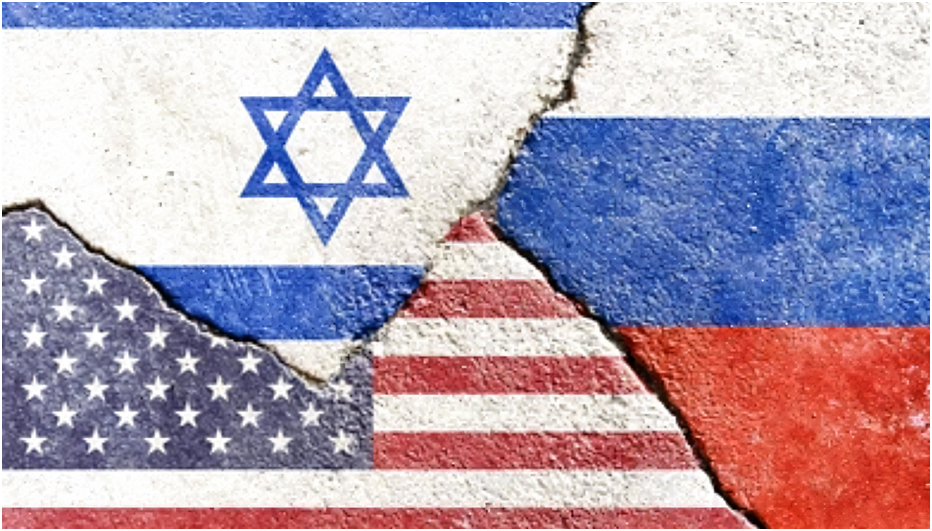In this era of fluid global order, strategic collusion among traditional adversaries is distinctively pronounced. To navigate the turbulent geo political currents of West Asia, the regional as well as the global power seek to steer in a strategic manner as interests often overlap and it remains mutually beneficial in countering common adversaries collectively. This collusion, subsides antagonism (though often temporarily) to satiate an immediate objective which reaps them reciprocal gains. This article tries to trace the uncommon complicity of Israel, United States of America (U.S.) and Russia in the arena of West Asia despite this collusion is prone to misalignment with the slightest flicker.
Around late April (2025), following a phone call with Israel’s prime minister Benjamin Netanyahu amid the U.S. negotiations with Iran over the Nuclear deal, U.S. President Trump acclaimed their unified stance over every issue at stake, ranging from trade to talks with Iran. However, this alignment seems dubious as their means to deter the adversary remains divergent which indicates a political contradiction. Moreover, lately Israel has exhibited its affinity towards Russia in particular arenas. Israel has reportedly lobbied for Russian presence in Syria in the post Assad regime, as it seeks to counterbalance the influence of Turkey as well as Iranian proxy in its immediate periphery. This stance reflects a stark contrast to its regular rhetoric.
This tendency of hedging, where Israel remains persistently aligned with the U.S. yet managing to strike a balance with Russia, particularly in Syria, reflects Israel’s calculated approach at realpolitik maneuvering. A nation often camouflages its selfish national pursuits through the rhetoric of security, threat and power play in diplomacy. This diplomacy of realpolitik not just acknowledges the importance of adaptability in tumultuous circumstances but also advocates converging with divergent and often conflicting normative ideologies. Its sheer advocacy of selfish and immoral maneuvers to satiate short term gains remains their foremost concern. This sheer collusion is perceived as strategically tactful as it is poised to leverage tangible gains for the state.
BILATERAL CHRONICLES
Typically, the U.S. ‘s relation with Russia have been characterised by antagonism since the inception of the 20th century till the perpetual cold war that followed the second world war. Even following the collapse of the Soviet Union, their competition and confrontational approach has meagerly subsided. However, currently a paradox is prominent under Trump’s presidency who exhibits a warmer stance towards Putin, much unlike his predecessor who labelled Putin a mere ‘Thug’. This nascent thaw is precisely prominent in West Asia, where Trump seeks a selective engagement in the region which aligns with his directives of isolationism and protectionism whereas Putin remains optimistic yet resilient to juggle the geopolitical intricacies in its favour.
The U.S. has remained Israel’s stalwart supporter since its inception and this sympathy was first inculcated in the early 20th century amid the budding aspiration for a Zionist state to alleviate the plights of antisemitism. Moreover, this affiliation stems from their shared ideological values of Democratic ideals and Rule of Law along with a Capitalistic approach that exhibits their orientation towards free market economy and also to a certain extent from their shared Judeo Christian identities as well. However, primarily this affinity solidified because of their mutual security concern that has remained at apex attention, precisely post the 9/11 era.
At the outset, the U.S. granted Israel a $100 million loan in 1949 and since then this bilateral assistance has soared to $130 billion which focuses on Israel’s extant security threats and capability building through security assistance. Moreover, the U.S. has designated Israel as its ‘Major Non-NATO Ally’. Another determining factor is the pro Israeli/Jewish influence on the U.S. policies as noted by John Mearsheimer and Stephan Walt in their distinguished essay, The Israel Lobby and U.S. Foreign Policy that the Israel Lobby, spearheaded by the American Israel Public Affairs Committee (AIPAC) remains a significant benefactor in American politics which advocates pro Israeli policies in the U.S. Congress.
On the other hand, the Russian stance towards Israel has remained empathetic towards its precarious security situation in the region. It is imperative to note that not the U.S. but the Soviet Union (later Russia) was the foremost nation to recognise the state of Israel in de jure terms and yet it failed to forge a robust alliance throughout the cold war era where either were positioned in polarised camps. However, with the eclipse of strict bipolarity and the ascendancy of President Putin (in March,2000) ameliorated Russia’s ties with Israel and he excelled at cultivating personal bonds with Israeli ministers.
Initially, Putin’s affiliation with Ariel Sharon was driven by their mutual perception of threat from Extremist terrorism and this affinity gained further traction during Netanyahu’s second term of premiership in 2009 when this ‘chemistry’ developed subsequently. Moreover, the ‘Putin Aliyah’ i.e. the wave of Jewish immigration in the post 2000 era considerably surged the influence of Russian Jews in Israeli domestic politics. Thus, in 2019, to appease the 12% of eligible voters of Israel, Netanyahu’s Likud party pulled up a placard of Netanyahu shaking hands with Putin which showcased their robust ties.
VESTED INTEREST IN WEST ASIA
It is imperative to chalk out their vested interest in West Asia to discern their political calculus in the region. In 2016, during a campaign rally Trump boasted that, “If we could get Russia to help us get rid of ISIS — if we could actually be friendly with Russia — wouldn’t that be a good thing?”. As apparent, in West Asia they seek to satiate their selfish aspiration and their convergence is certainly not directed by similar ideologies but through pragmatic interests. They ploy a calculated political gambit to pursue their self-interest as their ideological precepts don’t align seamlessly.
Recently, the U.S. withdrew its troops from Syria’s northern province of Al Hasakah and headed towards the Syria Iraq border in the east. This move came soon after Pentagon spokesperson Sean Parnell confirmed the U.S.’s plan to cut down its military presence in Syria to under thousand troops and this measure aptly reverberates Trump’s rhetoric of an isolationist approach. Moreover, under Donald Trump’s current presidency, which seeks a more isolationist, non interventionist and protectionist approach, it is bound to have detrimental consequences for the region and precisely on Israel’s strategic calculus in the region. Albeit, since inception Israel’s strategy has been of self sufficiency but in this realm of ‘America first’ sentiment, Israel is compelled to confront its precarious periphery on its own.
However, despite these divulge approaches Trump remains fond of his close political allies in the region and seeks to preserve his strategic partnerships in the region. This considerably tilts his alignment towards Israel as well as his Gulf allies. In this arena, Trump is vying to capitalise on his transactional Gulf allies to garner investments which would proactively stimulate the U.S. economy. Another core tenet of his strategy seeks to orchestrate a peace deal among Israel and other Arab nations like Saudi Arabia. Moreover, Trump remains desperate to strike a deal with Iran to contain a potential nuclear state in the region.
Concurrently, Russia exhibits similar aspirations over Iran’s nuclear program and in March, 2025, Putin even offered to orchestrate mediation between the U.S. and Iran, as Kremlin spokesperson Dmitry Peskov noted that, ‘Russia being an Iranian ally, will be doing what is possible to facilitate the peaceful solution to the (nuclear) problem (of Iran)’. However, this favourable empathy remains limited as their newly ratified Strategic Partnership Agreement lacks a crucial clause of no mutual defence i.e. the non obligatory clause which does not seek to establish a formal military alliance among the two. And albeit both U.S. and Russia prefers the benevolent means of talks with Iran, Israel vehemently opposes this softer stance towards a belligerent Iran.
The Russian stance in the West Asian arena is characterized by strategic involvement to extend its influence through a multifaceted approach which aims to secure military and economic foothold in the region. The American retreat from West Asia has caused a strategic vacuum and this opportunity facilitates Russia to satiate its twin aspirations i.e. the material ambitions and ideological intentions, in the region. It has extensively maneuvered in the region since the early 2000s but a pivotal occupation was apparent since October 2015, when Russia militarily intervened in Syria to bolster Assad’s regime and allied with Iran and the Lebanese militants, Hezbollah. And since, Russia has maintained a naval facility at Tartus (which serves as its sole warm-water port beyond the Black Sea and the only foothold in the Mediterranean) and an airbase at Hmeimim. Despite such a colossal presence of Russia closer to its northern border, Israel remained much more apprehensive of potential Iranian naval presence in Syria’s Mediterranean coast.
Likewise, Russia considerably aligns itself with Iran as well as Turkey in the region and yet it tolerates Israel’s belligerence over its allies because it remains empathetic towards Israel’s precarious security situation above all. Despite their contradictory stances, Israel and Russia are engaged in a deconfliction mechanism in Syria to avoid accidental confrontation which facilitates Israel to undermine the adversarial targets (Iran and the Hezbollah) well within Syria. Moreover, Russia’s presence in Syria significantly curbs the influence of Iranian as well as Turkish entrenchment near Israel’s northern borders. Concurrently, it keeps a check on consolidation of any Islamic extremist to accumulate power in the region as both Israel and Russia perceives it as an adversarial entity in the region. Hence, Russia leverages the balancing act in West Asia particularly in the post Assad reign where it seeks to collude more pragmatically in the region.
CONCLUSION
It is imperative to note that, as Trump exhibits a warmer stance towards Putin, this thaw is likely to bridge a constructive rapprochement between Moscow and Tel Aviv which would be mutually beneficial for either. It is also apparent that under Donald Trump’s current administration, Israel is bound to balance a delicate equilibrium between the U.S. and Russia, and Israel is likely to play by the rule book of Hedging as Israel seeks to leverage the optimal strategic affiliation with the U.S. and simultaneously chases affinity with Russia. In spite of their normative dissent over several issues, they opt to harness the potential arenas of cooperation. Hence, this nexus of Trump, Putin and Netanyahu is steered by pragmatic mutual benefits in this realm of fragile multipolarity and the diplomacy of Hedging has persisted as the poignant truth in this extant world order.




